The new app is called watchGPT and as I tipped off already, it gives you access to ChatGPT from your Apple Watch. Now the $10,000 question (or more accurately the $3.99 question, as that is the one-time cost of the app) is why having ChatGPT on your wrist is remotely necessary, so let’s dive into what exactly the app can do.
NEWS
New Facebook features fight election lies everywhere but ads
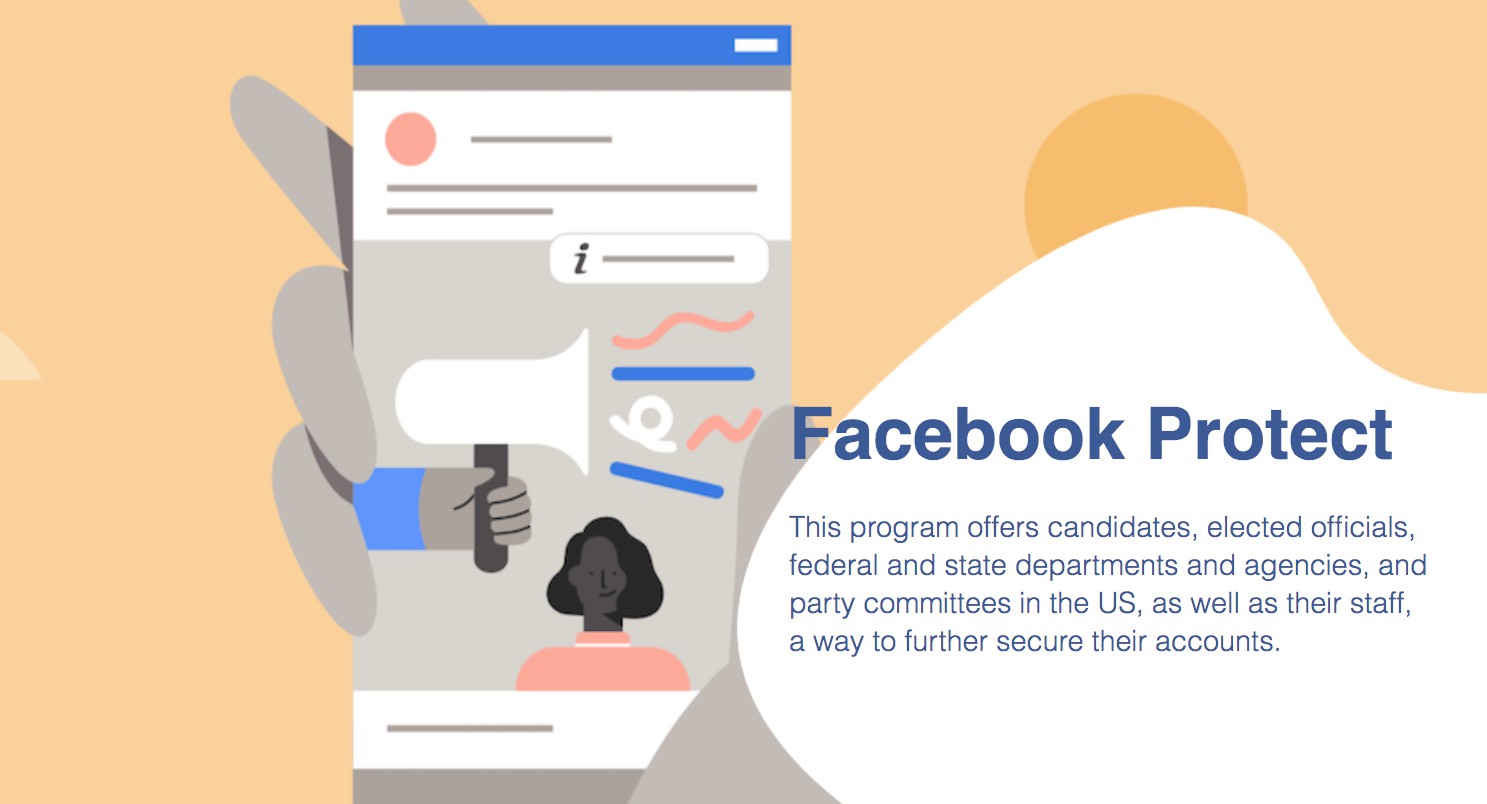
Heaven forbid a political candidate’s Facebook account gets hacked. They might spread disinformation…like they’re already allowed to do in Facebook ads…
Today Facebook made a slew of announcements designed to stop 2020 election interference. “The bottom line here is that elections have changed significantly since 2016,” and so has Facebook in response, CEO Mark Zuckerberg said on a call with reporters. “We’ve gone from being on our back foot to proactively going after some of the biggest threats out there.”
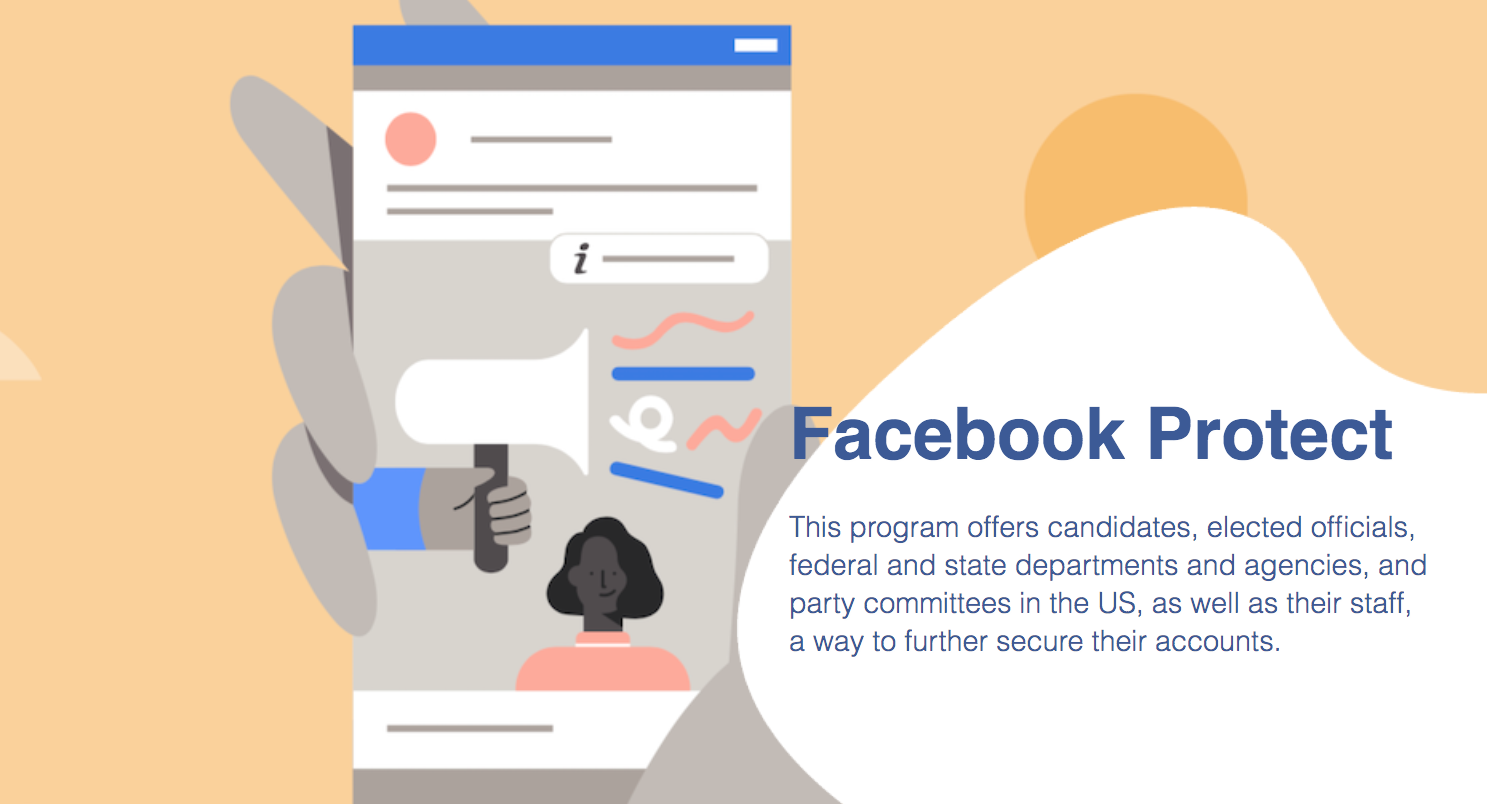
One new feature is called Facebook Protect. By hijacking accounts of political candidates or their campaign staff, bad actors can steal sensitive information, expose secrets and spread disinformation. So to safeguard these vulnerable users, Facebook is launching a new program with extra security they can opt into.
Facebook Protect entails requiring two-factor authentication, and having Facebook monitor for hacking attempts like suspicious logins. Facebook can then inform the rest of an organization and investigate if it sees one member under attack.
Today’s other announcements include:
- The takedown of foreign influence campaigns, three from Iran and one from Russia in order to protect users from deception.
- Labeling state-owned or controlled media organizations like Russia Today on their Facebook Pages and the Ad Library to help users identify potential propaganda.
- Added Page ownership transparency for ePages with large U.S. audiences and those verified to run political ads, which will have to display their owner’s organization’s legal name, city and phone number or website so it’s clear where information comes from.
- New transparency features around political ad spend, including a U.S. presidential candidate spend tracker, more geographic spending details, info on which apps an ad appears on and programmatic access to downloads of political ad creative.
- Much more prominent fact-checking labels will now run as interstitials warnings atop photos and videos on Facebook and Instagram that were fact-checked as false, rather than smaller labels attached below the post to make sure users know information is false before consuming it. Users will also be warned before they share posts fact-checked as false to keep them from going viral.
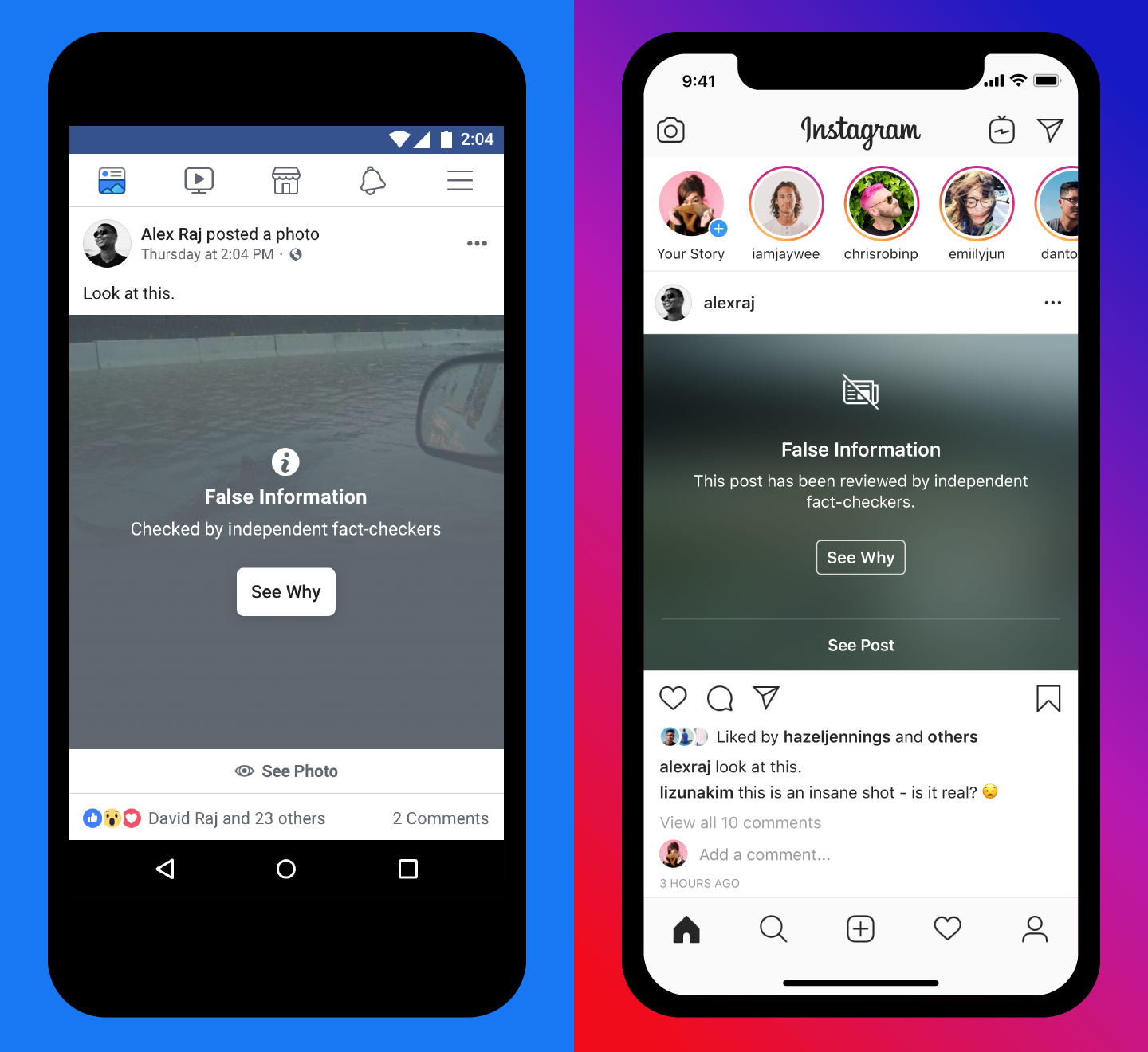
- A wider ban on voter suppression ads that suggest it’s useless to vote, provide inaccurate polling or voter eligibility information or threaten people if they vote or based on the outcome of an election to prevent intimidation and confusion.
- A $2 million investment from Facebook into media literacy projects to develop new methods of educating people to understand political social media and ads.
- Facebook Protect offering hack monitoring services to elected officials, candidates’ political party committees, government agencies and departments surrounding elections and verified users involved in elections.
![]()
Combined, the efforts could protect both campaigns and constituents from misinformation while giving everyone more clarity about where content originates. Yet the approach highlights Facebook’s tightrope walk between policing its networks and overstepping into censorship.
In a speech last week, Zuckerberg tried to firmly plant Facebook as erring on the side of giving people a voice rather than stifling speech. He raised the threat of China’s influence over foreign businesses by dangling its giant market in exchange for adherence to its political values. And he tried to defend allowing lies in political ads, arguing that banning political ads on Facebook as I’ve recommended the company do would benefit incumbents and silence challengers who don’t have media attention.
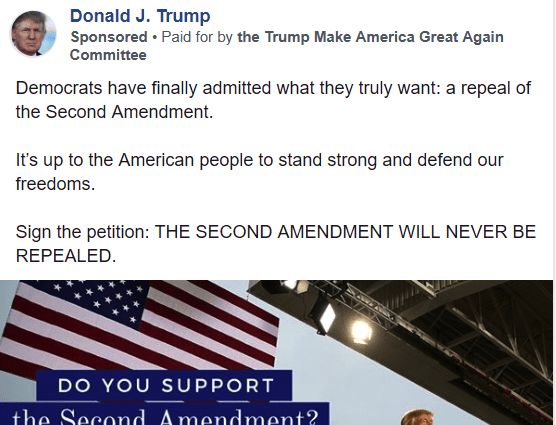
A Trump ad spreads misinformation claiming Democrats want to repeal the second amendment
Yet throughout the call, Zuckerberg was hammered with questions about Facebook’s willingness to fact check what users share with friends, but not what politicians pay to show to millions of voters.
“People should make up their own minds about what candidates are credible. I don’t think those determinations should come from tech companies . . . People need to be able to see this content for themselves,” Zuckerberg insisted. Yet if Facebook is willing to cover photos containing misinformation with a warning label you have to click to see past, it’s strange that it’s unwilling to do the same for political ads.
Like farming out fact-checking to third-party news outlets as Facebook already does, banning political ads wouldn’t force Facebook to judge the truth of individual statements, and they’d still have the right to share what they want to their own followers.
When I asked why he believes banning political ads would favor incumbents, Zuckerberg admitted, “You’re right that incumbents can raise more money,” and he wasn’t sure there’d been a comprehensive study on the matter. His defense relied on anecdotal beliefs of unnamed sources:
I’ve talked to a lot of people. The general belief that they have, when they’re a challenger, is that they rely on different mechanisms like ads in order to get their voices into a debate more than incumbents do . . .
From all of the conversations that I’ve had, the general overwhelming consensus from people who are participating in these things and who work on them has been that removing political ads would favor incumbents.
While the rest of Facebook’s announcements today felt like sensible steps in the right direction, the company will need stronger arguments for why it polices misinformation shared by users but not political ad campaigns.
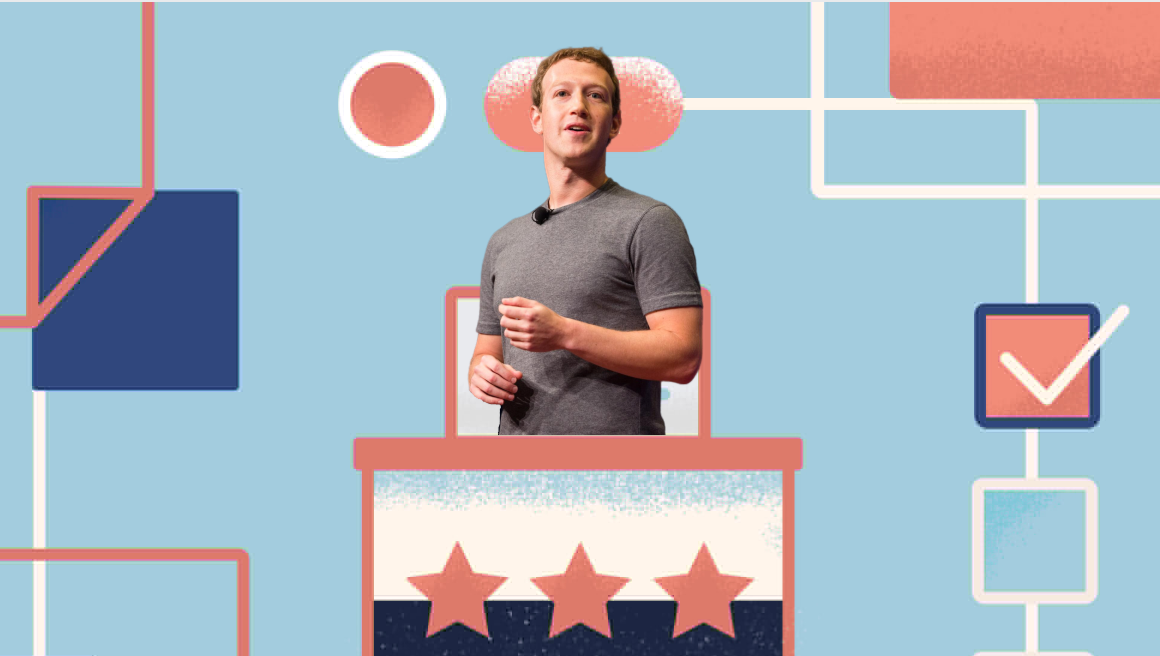
If it wants to find a better middle-ground, it could offer standardized ad units for political campaigns that endorse the candidate and ask for donations, but can’t make potentially untruthful assertions about them or their competitors. Alternatively it could apply fact-check labels to political ads without making calls of veracity itself. Facebook could also build other ways for challengers to grow their voice outside of ads so it could ban them without supposedly empowering incumbents.
Otherwise, it faces a political ad misinformation arms race in stern contrast to its other pro-truth efforts announced today. What will Facebook do if campaigns make increasingly malicious and inaccurate statements about their rivals via ads, claiming only donations to their candidate can save society? And what if they keep pouring all the money they unscrupulously raise into more ads? “My opponent eats babies. Donate to me by midnight. Only I can stop them from becoming America’s dictator.”
At least most of the time, users can try to avoid politics by ignoring campaign pages and unfollowing their crazy uncles. But untrue ads inject polarization and discord into people’s feeds. Facebook’s policies give the richest, most craven candidates the loudest voices. Can the social network and the democratic process survive a whole year of top spenders shouting lies?
Facebook Faces Yet Another Outage: Platform Encounters Technical Issues Again

Uppdated: It seems that today’s issues with Facebook haven’t affected as many users as the last time. A smaller group of people appears to be impacted this time around, which is a relief compared to the larger incident before. Nevertheless, it’s still frustrating for those affected, and hopefully, the issues will be resolved soon by the Facebook team.
Facebook had another problem today (March 20, 2024). According to Downdetector, a website that shows when other websites are not working, many people had trouble using Facebook.
This isn’t the first time Facebook has had issues. Just a little while ago, there was another problem that stopped people from using the site. Today, when people tried to use Facebook, it didn’t work like it should. People couldn’t see their friends’ posts, and sometimes the website wouldn’t even load.
Downdetector, which watches out for problems on websites, showed that lots of people were having trouble with Facebook. People from all over the world said they couldn’t use the site, and they were not happy about it.
When websites like Facebook have problems, it affects a lot of people. It’s not just about not being able to see posts or chat with friends. It can also impact businesses that use Facebook to reach customers.
Since Facebook owns Messenger and Instagram, the problems with Facebook also meant that people had trouble using these apps. It made the situation even more frustrating for many users, who rely on these apps to stay connected with others.
During this recent problem, one thing is obvious: the internet is always changing, and even big websites like Facebook can have problems. While people wait for Facebook to fix the issue, it shows us how easily things online can go wrong. It’s a good reminder that we should have backup plans for staying connected online, just in case something like this happens again.
NEWS
We asked ChatGPT what will be Google (GOOG) stock price for 2030

Investors who have invested in Alphabet Inc. (NASDAQ: GOOG) stock have reaped significant benefits from the company’s robust financial performance over the last five years. Google’s dominance in the online advertising market has been a key driver of the company’s consistent revenue growth and impressive profit margins.
In addition, Google has expanded its operations into related fields such as cloud computing and artificial intelligence. These areas show great promise as future growth drivers, making them increasingly attractive to investors. Notably, Alphabet’s stock price has been rising due to investor interest in the company’s recent initiatives in the fast-developing field of artificial intelligence (AI), adding generative AI features to Gmail and Google Docs.
However, when it comes to predicting the future pricing of a corporation like Google, there are many factors to consider. With this in mind, Finbold turned to the artificial intelligence tool ChatGPT to suggest a likely pricing range for GOOG stock by 2030. Although the tool was unable to give a definitive price range, it did note the following:
“Over the long term, Google has a track record of strong financial performance and has shown an ability to adapt to changing market conditions. As such, it’s reasonable to expect that Google’s stock price may continue to appreciate over time.”
GOOG stock price prediction
While attempting to estimate the price range of future transactions, it is essential to consider a variety of measures in addition to the AI chat tool, which includes deep learning algorithms and stock market experts.
Finbold collected forecasts provided by CoinPriceForecast, a finance prediction tool that utilizes machine self-learning technology, to anticipate Google stock price by the end of 2030 to compare with ChatGPT’s projection.
According to the most recent long-term estimate, which Finbold obtained on March 20, the price of Google will rise beyond $200 in 2030 and touch $247 by the end of the year, which would indicate a 141% gain from today to the end of the year.
Google has been assigned a recommendation of ‘strong buy’ by the majority of analysts working on Wall Street for a more near-term time frame. Significantly, 36 analysts of the 48 have recommended a “strong buy,” while seven people have advocated a “buy.” The remaining five analysts had given a ‘hold’ rating.

The average price projection for Alphabet stock over the last three months has been $125.32; this objective represents a 22.31% upside from its current price. It’s interesting to note that the maximum price forecast for the next year is $160, representing a gain of 56.16% from the stock’s current price of $102.46.
While the outlook for Google stock may be positive, it’s important to keep in mind that some potential challenges and risks could impact its performance, including competition from ChatGPT itself, which could affect Google’s price.
Disclaimer: The content on this site should not be considered investment advice. Investing is speculative. When investing, your capital is at risk.
NEWS
This Apple Watch app brings ChatGPT to your wrist — here’s why you want it

ChatGPT feels like it is everywhere at the moment; the AI-powered tool is rapidly starting to feel like internet connected home devices where you are left wondering if your flower pot really needed Bluetooth. However, after hearing about a new Apple Watch app that brings ChatGPT to your favorite wrist computer, I’m actually convinced this one is worth checking out.
-

 WORDPRESS7 days ago
WORDPRESS7 days ago10 WordPress Influencers to Follow in 2024 – WordPress.com News
-

 SEARCHENGINES7 days ago
SEARCHENGINES7 days agoGoogle Image Search Adds Pixel Level Object Segmentation Animation
-
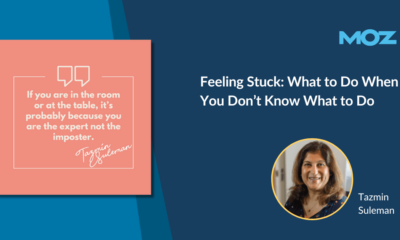
 MARKETING7 days ago
MARKETING7 days agoFeeling Stuck: What to Do When You Don’t Know What to Do
-

 PPC6 days ago
PPC6 days agoCompetitor Monitoring: 7 ways to keep watch on the competition
-

 PPC5 days ago
PPC5 days agoA History of Google AdWords and Google Ads: Revolutionizing Digital Advertising & Marketing Since 2000
-

 SEARCHENGINES6 days ago
SEARCHENGINES6 days agoMore Google March 2024 Core Update Ranking Volatility
-

 WORDPRESS6 days ago
WORDPRESS6 days agoThrive Architect vs Divi vs Elementor
-

 PPC6 days ago
PPC6 days ago31 Ready-to-Go Mother’s Day Messages for Social Media, Email, & More












